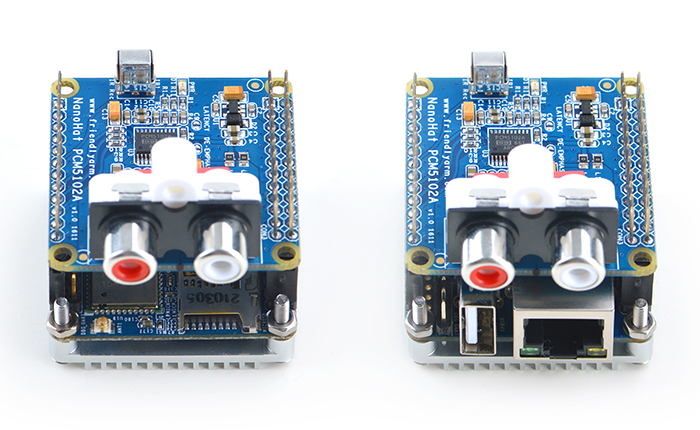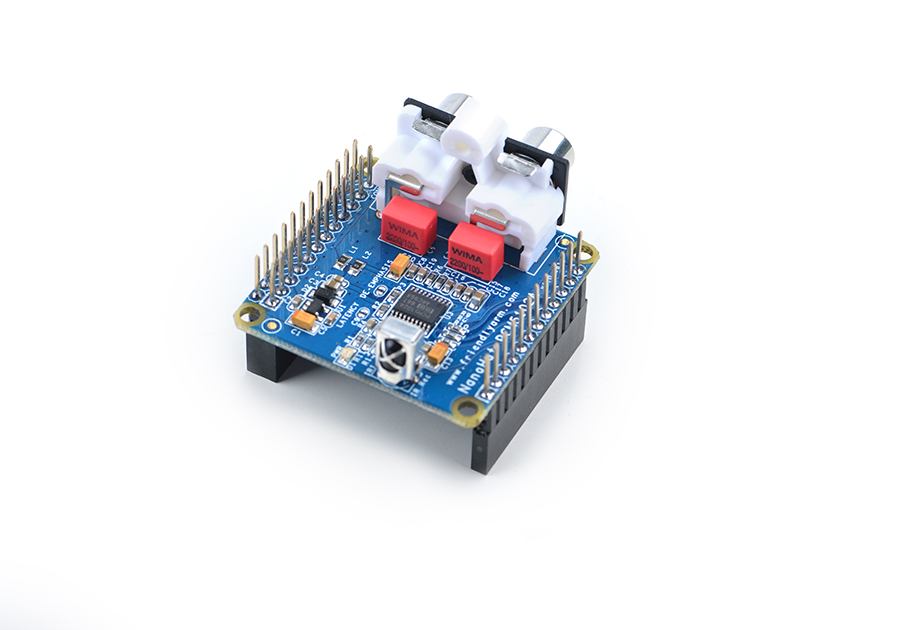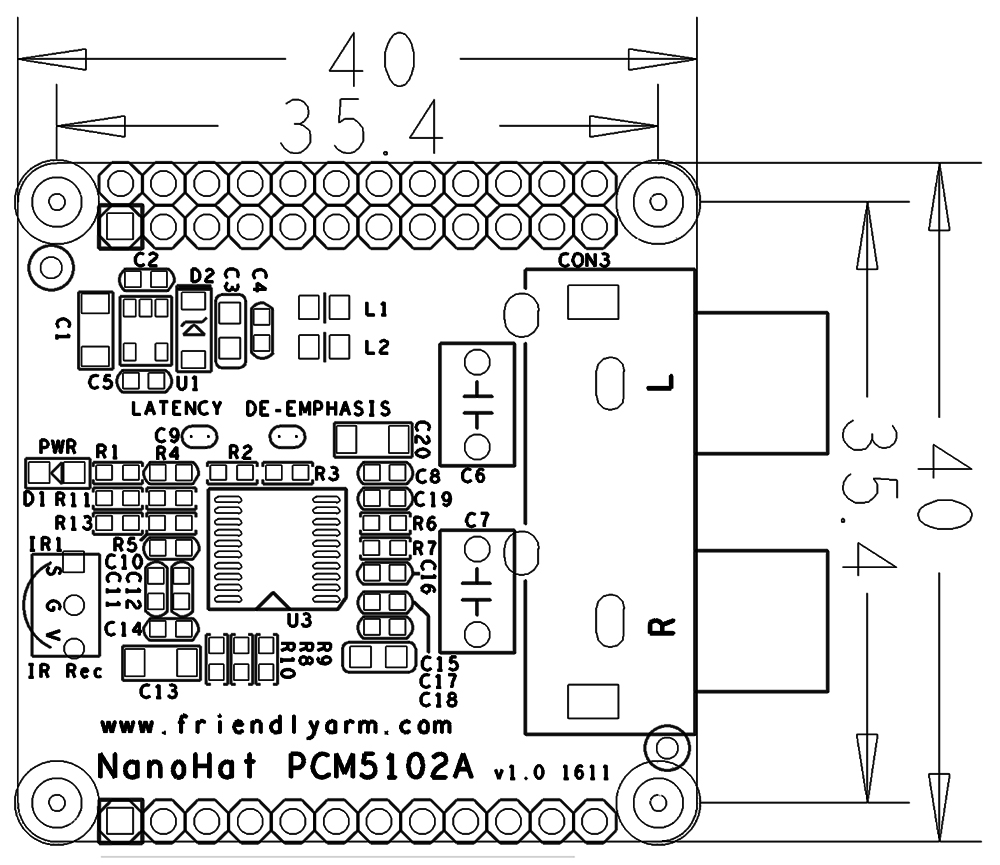Difference between revisions of "Matrix - NanoHat PCM5102A"
From FriendlyELEC WiKi
(→使用方法) |
(→Resources) |
||
| (11 intermediate revisions by 2 users not shown) | |||
| Line 4: | Line 4: | ||
[[File:Matrix - NanoHat PCM5102A.jpg|thumb|NanoHat PCM5102A]] | [[File:Matrix - NanoHat PCM5102A.jpg|thumb|NanoHat PCM5102A]] | ||
* The Matrix - NanoHat PCM5102A module uses TI's DAC audio chip PCM5102A and NS' low-noise, ultra-low dropout LP2992 regulator. PCM5102A's sample rates up to 384kHz and its resolution is 32-bit. | * The Matrix - NanoHat PCM5102A module uses TI's DAC audio chip PCM5102A and NS' low-noise, ultra-low dropout LP2992 regulator. PCM5102A's sample rates up to 384kHz and its resolution is 32-bit. | ||
| − | * | + | * Its dynamic range is 112dB. Its THD+N at –1 dBFS is -93db. Its full-scale single-ended output is 2.1V. The SNR is 120dB. |
| − | + | ||
* Its onboard VS1838B infrared receiver allows it to be remote-controlled. | * Its onboard VS1838B infrared receiver allows it to be remote-controlled. | ||
| − | * | + | * This module has exactly the same dimension as the NanoPi NEO/Air and can be stacked on an NanoPi NEO/Air. |
| − | == | + | ==Hardware Spec== |
| − | * | + | * Ultra-low out-of-band noise |
| − | * | + | * Audio data bit length: 16-bit, 24-bit and 32-bit |
| − | * | + | * Audio format selection: I2S (Low) / Left-justified |
| − | * | + | * Sampling frequency: 384KHz, resolution: 32-bit |
| − | * | + | * Onboard infrared receiver |
[[File:Matrix - NanoHat PCM5102A_PCB.png | frameless|400px|NanoHat PCM5102A-PCB]] | [[File:Matrix - NanoHat PCM5102A_PCB.png | frameless|400px|NanoHat PCM5102A-PCB]] | ||
| − | * | + | * Pin Description: |
| − | NanoPi NEO/Air 24 | + | NanoPi NEO/Air 24 Pin header is not listed here. Refer to NanoPi NEO/Air's wiki site for more details<br> |
[http://wiki.friendlyarm.com/wiki/index.php/NanoPi_NEO/zh NanoPi NEO] | [http://wiki.friendlyarm.com/wiki/index.php/NanoPi_NEO/zh NanoPi NEO] | ||
[http://wiki.friendlyarm.com/wiki/index.php/NanoPi_NEO_Air/zh NanoPi NEO Air] | [http://wiki.friendlyarm.com/wiki/index.php/NanoPi_NEO_Air/zh NanoPi NEO Air] | ||
<br> | <br> | ||
| − | + | 12Pin header pin description: | |
{| class="wikitable" | {| class="wikitable" | ||
|- | |- | ||
| − | | | + | |Pin || Name || Description |
|- | |- | ||
|1 ||VDD_5V|| 5V Power In | |1 ||VDD_5V|| 5V Power In | ||
| Line 53: | Line 52: | ||
|} | |} | ||
| − | == | + | ==Applications== |
| − | NanoHat | + | The NanoHat PCM5102A can be stacked on the NanoPi NEO/Air. Here is a hardware setup:<br> |
[[File:Matrix - NanoHat PCM5102A_nanopi_NEO.jpg|frameless|600px|Matrix - NanoHat | [[File:Matrix - NanoHat PCM5102A_nanopi_NEO.jpg|frameless|600px|Matrix - NanoHat | ||
PCM5102A_nanopi_NEO]] | PCM5102A_nanopi_NEO]] | ||
| − | == | + | ==How to Play== |
| − | + | After you mount your PCM5102A to a NanoPi NEO/Air connect your PCM5102A to speakers with a RCA to 3.5mm audio jack cable and power on your NanoPi NEO/Air<br /> | |
| − | + | ||
| − | + | Run the following commands to play an audio file (in our example we played kewang.mp3) | |
<syntaxhighlight lang="bash"> | <syntaxhighlight lang="bash"> | ||
madplay kewang.mp3 | madplay kewang.mp3 | ||
</syntaxhighlight> | </syntaxhighlight> | ||
| + | Here is what you expect to observe:<br /> | ||
| + | [[File:Matrix - NanoHat PCM5102A play.jpg|frameless|500px]]<br /> | ||
| − | == | + | ==Resources== |
| − | *[Schematic]([http:// | + | *[Schematic]([http://wiki.friendlyarm.com/wiki/images/d/d3/SCHEMATIC_NanoHat_PCM5102A.pdf Schematic - NanoHat PCM5102A.pdf]) |
*[Datasheet]([http://www.ti.com.cn/cn/lit/ds/symlink/pcm5102a.pdf PCM5102A]) | *[Datasheet]([http://www.ti.com.cn/cn/lit/ds/symlink/pcm5102a.pdf PCM5102A]) | ||
| + | |||
| + | ==Update Log== | ||
| + | ===Jan-20-2017=== | ||
| + | * Released English version | ||
Latest revision as of 08:11, 20 January 2017
Contents
1 Introduction
- The Matrix - NanoHat PCM5102A module uses TI's DAC audio chip PCM5102A and NS' low-noise, ultra-low dropout LP2992 regulator. PCM5102A's sample rates up to 384kHz and its resolution is 32-bit.
- Its dynamic range is 112dB. Its THD+N at –1 dBFS is -93db. Its full-scale single-ended output is 2.1V. The SNR is 120dB.
- Its onboard VS1838B infrared receiver allows it to be remote-controlled.
- This module has exactly the same dimension as the NanoPi NEO/Air and can be stacked on an NanoPi NEO/Air.
2 Hardware Spec
- Ultra-low out-of-band noise
- Audio data bit length: 16-bit, 24-bit and 32-bit
- Audio format selection: I2S (Low) / Left-justified
- Sampling frequency: 384KHz, resolution: 32-bit
- Onboard infrared receiver
- Pin Description:
NanoPi NEO/Air 24 Pin header is not listed here. Refer to NanoPi NEO/Air's wiki site for more details
NanoPi NEO
NanoPi NEO Air
12Pin header pin description:
| Pin | Name | Description |
| 1 | VDD_5V | 5V Power In |
| 2 | NC | Not Connected |
| 3 | NC | Not Connected |
| 4 | NC | Not Connected |
| 5 | NC | Not Connected |
| 6 | IR Receiver | IR Receiver |
| 7 | NC | Not Connected |
| 8 | LRCK | I2S/PCM Sample Rate Clock/Sync |
| 9 | BCK | I2S/PCM Sample Rate Clock |
| 10 | DIN | I2S/PCM Serial Data Input |
| 11 | NC | Not Connected |
| 12 | GND | GND |
3 Applications
The NanoHat PCM5102A can be stacked on the NanoPi NEO/Air. Here is a hardware setup:

4 How to Play
After you mount your PCM5102A to a NanoPi NEO/Air connect your PCM5102A to speakers with a RCA to 3.5mm audio jack cable and power on your NanoPi NEO/Air
Run the following commands to play an audio file (in our example we played kewang.mp3)
madplay kewang.mp3
Here is what you expect to observe:

5 Resources
- [Schematic](Schematic - NanoHat PCM5102A.pdf)
- [Datasheet](PCM5102A)
6 Update Log
6.1 Jan-20-2017
- Released English version

